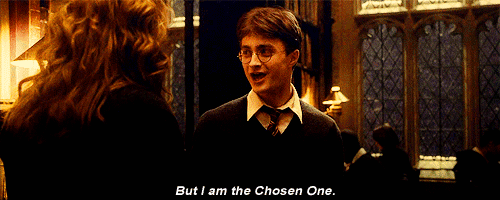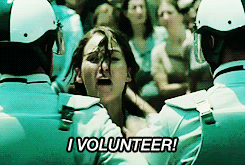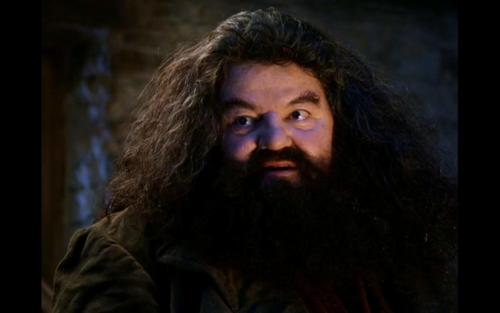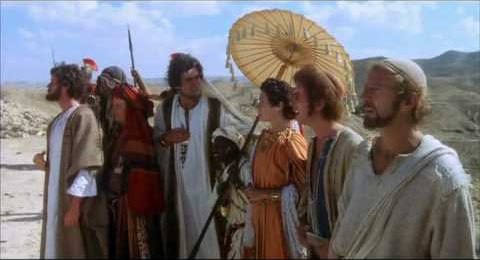 |
| What you can expect from this post. (Hermione is awesome) |
First off, let's define your average, home grown "chosen one". (Also, I'm not going to go into it because it's a whoooole other rant, but they're usually male, straight and Caucasian. Just sayin').
1. They're above average intelligence but they're under-achievers (in the bill of characters, they are not "the smart one"). They are either moderately good at things with no discernible skills to speak of
AND/OR
Any skills they have come to them naturally and with minimal amount of work or effort, to the shock and admiration of all/most other characters
2. They are unhappy with their lives and feel as thought they are meant for more. They generally live somewhere boring and have a boring, unfulfilling job or boring unfulfilling prospects. They are more often than not oppressed in some way shape or form.
3. They have a strong moral compass and tendency towards self sacrifice, despite not necessarily having any reason to develop these (I'll come back to this point).
Then there's the basic story structure:
Boring life > Some kind of discovery relating to destiny and whatnot >
Obstacle that only the chosen one can overcome > Save the day, get the girl yadda yadda yadda.
These aspects are fairly universal in terms of your stock "chosen ones". As far as character goes, many stray into Mary Sue territory with a healthy helping of archetypal hero.
What I'm trying to get at is that these "chosen ones" are normal people who we, the audience, are supposed to relate to and imagine ourselves being similar to (hence the above average intelligence, writers and readers love that). They are escapism at their most simplistic, they exist so that we can spend a certain amount of time pretending that we are something that we are not, that is, extraordinary, before getting back to our boring-ass lives.
That is, I assume. I wouldn't know much about ordinariness.
And honestly, there's nothing wrong with escapism. I love escapism, daydreaming and pretend as much as the next person. That's not the problem. The problem is this trope's overuse, pretense as something original and deep and the lazy, lazy, LAZY use.
Problem 1: Destiny makes stories stupid
(unless used with extreme care and cleverness)
So, I mentioned in my review of the finale of The Legend of Korra that the whole "balance of good and evil" trope is inherently flawed and near universally misunderstood by writers, fans and critics alike. The same seems to go for the idea of destiny and fixed timeline. (I also mention this in my deconstruction of the whole time-turner thing in Harry Potter, give it a look). I'm going to put this as simply as humanly possible:
If destiny exists in your fantasy world, it makes ZERO difference to how anything plays out. So, please stop acting like it does.
This confuses people so allow me to give an example. Let's say it's Tuesday and I, Rachel "living-in-a-predestined-universe" O'Connor decide to make myself a ham and cheese sandwich. I do this and eat it. Now, because I'm living in a predestined universe, there is no way that, on that particular Tuesday, I would NOT have made myself a ham and cheese sandwich and proceeded to eat it. It was DESTINY! However, as lazy and/or bad writers fail to realise, me eating a destiny sandwich is no more interesting than me eating a sandwich in a universe in which things are not predestined.
In fact, there is no way to tell the difference, so there might as well not be one. If your life were to be set out in front of you, a set path that you will walk no matter what, it would make absolutely no difference to your agency, your decision making ability, your "free-will" as it were. This is where I tend to lose people. There's this idea that if destiny existed we would be less free. But that is assuming that you are free to begin with. The way we think, the way we make decisions and observations and judgments has been, unbeknownst to us, molded from birth. We are raised by our parents, the media we are exposed to, our environments: the places and times in which we grow up. How many of these things do we have control over? Media? Maybe, but not at a very young age, when it matters most. Our environments? Ha, nope. Parents? Well, how were they raised? It's a vicious circle of uncontrollable things. Then there's the question of "what controls the uncontrollable?" If you're religious I suppose you have your answer but I don't buy into that. Basically what I'm saying it that you are merely a product of a series of uncontrollable events, so why should your life be any different? That's how I see it anyway. My entire life up to that point was leading up to me deciding to make that particular sandwich on that particular Tuesday. That could well be but it doesn't make the decision any more life changing than any other decision I make, under the illusion of free-will. and it certainly doesn't make the sandwich special.
Okay, calm down. What I'm getting at is, 1) I'm super philosophical and deep, be impressed
and 2) using a destiny plot driver does nothing to your story except make it another "destiny!" story. The tension is the same and adding prophecies without thinking them through properly either kills reader investment in the story or makes it a plot colander. The destiny thing may have been original once but let's face it, Greek mythology and the Old Testament used it more than enough to wear it thin, and that was millennia ago. This is the twenty first goddamn century, can we at least try to employ better, different story telling devices?!
Problem 2: "Chosen Ones" are not interesting
Which, I hear the more up to speed of you yelling at your computer screens, is kind of the point. This is true. According to the whole "chosen one" package, an uninteresting, unassuming character is forced to discover their true mettle through a challenge that they must face, whether or not they want to. It's tired and I hate it, but that is the formula.
The main problem I have here is the glorification of stuff just happening around the protagonist. For example, Harry Potter would be a more interesting story if Harry had run away from the Dursleys in book one and found the magical world on his own. He may still be Harry "the-futhermucking-chosen-one" Potter but at least he's taking something into his own hands.
(Sidenote: Yes, we've spoken on how agency is no different in fatalistic narratives but I can still gripe about characters being static the entire freaking time. Another common misconception about fatalistic universes is that if you just stand still, fate will just, um, happen. This is wrong. If it is predestined that you will make this shitty judgement then you will stand still, starve to death and that will have been your destiny. Thank you for playing, goodnight.)
Taking it into his/her own hands being working. Because, at the end of the day, if our society favours people who become great through next to no merit of their own then, to an extent, our society is undermining those who become great through actual hard work and effort. According to our exhaustive use and consumption of the chosen one narrative, Harry Potter (a well meaning and morally strong but ultimately unskilled individual) is more valuable than Hermione Granger (an enthusiastic academic who is effectively self made and works for all the success she attains over the course of the series) or Neville Longbottom (an originally meek and ridiculed individual who gradually gains self confidence and eventually steps up to take control). Which is not, in my honest opinion, true. Nor is it a good message to be sending as it is, in it's most basic form, saying "It doesn't matter how much you work for responsibility and/or power, you will never be as accomplished or admired as those who have responsibility and power forced upon them." I love the Harry Potter books, and Harry's great but I once I thought about it at length (years after finishing the series) I would probably have preferred Harry as a lesser character. I would have liked the same story only perhaps more focused on Hermione or Luna or Neville or Sirius. We don't have enough of them, stories with chosen ones that don't star the chosen one.
In short: the idea of a chosen one places them on a pedestal. This person is reluctant and this is shown as a good thing. This person is average and un-extraordinary yet they are shown to be greater than those who do good despite some prophecy or mentor figure spurring them on to do so. It's a slightly worrying trend for one so common.
Well, what should we do instead?
Ah, the big questions. "If it keeps making money, why should we change the formula?" Because, my friends, if anything has been learned in these times of financial crisis (and I'm sure much less has been than should have been) it's that bubbles burst. Trends and fads and crazes will all dry up, no matter how long they seem to have been around (see Gangnam Style of you want proof of that). Chosen one stories have their time in the sun and fade (and return again, unfortunately, because it's a super easy story structure to follow for hacky writers, grrr) but right now seems to be a good era for heroes and heroines setting their own paths. Katniss Everdeen's sister, Prim, was technically the "chosen one" of that series but lucky for them (and us) a more interesting character swooped in and took responsibility.
"Ender's Game" was only moderately well received, "The Mortal Instruments" grossed at slightly over half their budget (which was 60,000,000) and made only about 9,000,000 in its opening weekend and "Divergent" looks... well, it looks like it'll be an interesting social experiment (I'll be nice until it's actually out, sounds preeeetty terrible concept-wise). The last good "Chosen One" film I remember seeing is probably Kung Fu Panda 2 but that's partially because the chosen one thing is downplayed in that and he does still have to train and adapt.
 |
| "Please, anything but more chosen one stories!" |
I propose we come up with better tropes to overuse and eventually grow tired of (and complain about on obscure blogs). I mentioned earlier the "chosen one narrative from the viewpoint of someone other than the chosen one" idea. Pretty sure the last time that was done in the mainstream was in Monty Python's "Life of Brian" (you know, with one of the really early chosen ones, whatsisface with the beard).
I've also heard that "The Lego Movie" is being all subversive and clever with its fine self on this front, and I do look forward to seeing it (and getting to the bottom of whether or not everything is, in fact, awesome). I for one would also like to see more "Stuff happens around a totally lethargic protagonist" which can be another fun subversion of the chosen one model (when done well, clever satire generally needs to be identifiable as satire). Finally, while one of the only tropes more used than "the chosen one" is "the underdog victory" (and don't get me wrong, the two are far from mutually exclusive) I would much rather see a story about someone struggling for recognition than someone unfairly granted it (ahem* says the writer *ahem ahem* I wonder why she feels that *ahem* Rachel really needs to stop self critiquing mid spiel *ahem ahem*)
I've also heard that "The Lego Movie" is being all subversive and clever with its fine self on this front, and I do look forward to seeing it (and getting to the bottom of whether or not everything is, in fact, awesome). I for one would also like to see more "Stuff happens around a totally lethargic protagonist" which can be another fun subversion of the chosen one model (when done well, clever satire generally needs to be identifiable as satire). Finally, while one of the only tropes more used than "the chosen one" is "the underdog victory" (and don't get me wrong, the two are far from mutually exclusive) I would much rather see a story about someone struggling for recognition than someone unfairly granted it (ahem* says the writer *ahem ahem* I wonder why she feels that *ahem* Rachel really needs to stop self critiquing mid spiel *ahem ahem*)
I'm am the chosen one and I command thee to
Embrace the Madness


